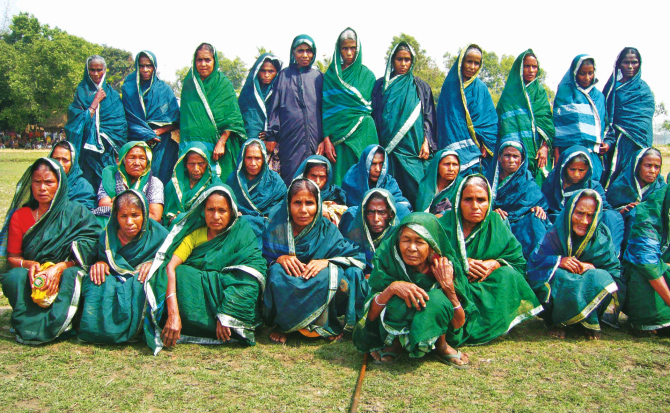“Finally justice is delivered. I was waiting for this moment. The butcher is finally hanged. Million thanks to Allah,” said Begum Bewa, a 60 plus widow from Sohagpur locality of north Bangladesh, as she noted the news relating to the hanging of Muhammad Kamaruzzaman in local television.
She was however not alone to cheer about the execution of Kamaruzzaman on 11 April 2015 evening in Dhaka’s central jail for the war crime as the Rajakar turned the Sohagpur village into a Bidhaba Palli (meaning a village of widows) killing over a hundred male Muktijoddhas (freedom fighters) in July 1971.
Kamaruzzaman led Pakistan Army-backed Al-Badr militia forces to kill at least 164 unarmed villagers and raped many women in Sohagpur under Sherpur district. The pages of Bangladesh history narrates that the Al-Badr was involved in genocide, killing, rape, looting and arson in greater Mymensingh, Jamalpur, Netrakona, Kishoreganj, Tangail, Sherpur etc.
Bangladesh emerged as a sovereign nation following the 1971 Muktijuddha, where its freedom fighters received supports from Indian government forces. Millions of Bangladeshi (then East Pakistanis) freedom fighters were killed, over 200,000 women raped by the then West Pakistani forces. Many of them also fled to Indian provinces like West Bengal, Assam and Tripura. Finally the Pakistani force surrendered in Dhaka and an independent nation (Bangladesh) was born on 16 December 1971.
Kamaruzzaman, a journalist turned Islamist political leader of Bangladesh, was convicted and sentenced to death by a special international crimes tribunal in May 2013 for the crimes he committed four decades back against liberation war fighters. The order was upheld by the Bangladesh’s apex court in November last year. On 6 April last, the Supreme Court of Bangladesh rejected his final plea, filed on 5 March 2015 to revise the death sentence against his crimes involving genocide, rape and arson.
The Jamaat-e-Islami leader was buried next day in his ancestral village in Sherpur. Prior to his execution, Kamaruzzaman’s close relatives including his wife Nurun Nahar met him in Dhaka jail. Kamaruzzaman had the option for seeking presidential pardon, but he opted not to do so like another Jamaat leader Abdul Quader Molla, who too did not seek clemency and faced the gallows on 12 December 2013 for his crimes against the Bangladesh freedom fighters in the 1971 Liberation War.
A master degree holder in journalism from Dhaka University, Kamaruzzaman maintained his journalism career with political proximity to Bangladesh Jamaat-e-Islami party. Kamaruzzaman used to edit Bengali weekly Sonar Bangla (meaning Golden Bangladesh) and Jamaat’s daily Sangram (meaning Movement). Even his membership to Bangladesh National Press Club was valid till 2013.
Kamaruzzaman was a higher secondary level student in 1971 and associated with Islamic students organizations. He was also an organizer of the Pakistani army sponsored Al-Badr group which wanted to spoil the Bangladesh liberation movement. Later he took the leadership of Jamaat-e-Islami party, which argued for reunification (of Bangladesh) with Pakistan and expulsion of minorities from the Muslim dominated south Asian country.
Bangladesh Prime Minister Sheikh Hasina Wajed set up the war crimes tribunal in 2010 amidst the oppositions from various corners including the Jamaat-e-Islami supports, which was once an ally to Bangladesh Nationalist Party (led by Begum Khaleda Zia). They even alleged that the present Awami League led government, which came to power in 2008, was scoring political mileages with the war crimes trials.
Besides Jamaat leaders, various international human rights groups criticized the execution of Kamaruzzaman terming the trials as flawed (not meeting international standards). However most of Bangladesh civil society groups and youths’ forum appreciated the action as Kamaruzzaman had never shown repentance for his past criminal acts.
The Daily Observer, a popular English daily newspaper from Dhaka, editorialized the issue to praise the Hasina government that after the execution of Kamaruzzaman a sense of relief was felt in the country.
“We as a nation have made it clear to the outside world, to international organizations and individual governments, that it is not retribution we are pursuing but a simple call of moral conscience and the law. Those who have questioned and continue to question the fairness of the trial must take a look again at the entire process before rushing to judgment,” added the editorial.
The Sohagpur villagers including 32 war widows now find a new reason to smile amidst all their hardships. Besides Begum Bewa, many more widows in Sohagpur as well as other Bangladeshi villages are still waiting for final punishments of 12 other criminals, who have already been convicted by the Bangladesh war crimes tribunal.
The author is a Guwahati based journalist and an expert on Bangladesh
Editors note: While we appreciate the detailed account of this period in Bangladesh as delivered by our colleague Thakuria we remind readers that Pressenza is against the death penalty.






